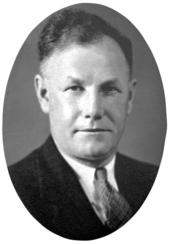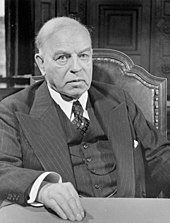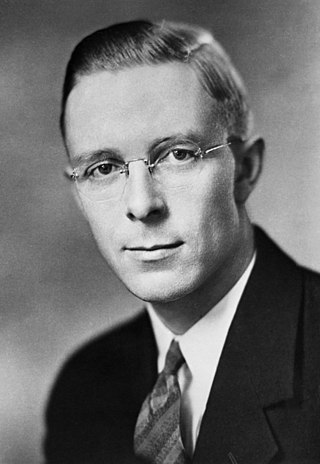
Ernest Charles Manning was a Canadian politician and the eighth premier of Alberta between 1943 and 1968 for the Social Credit Party of Alberta. He served longer than any other premier in the province's history and was the second longest-serving provincial premier in Canadian history.
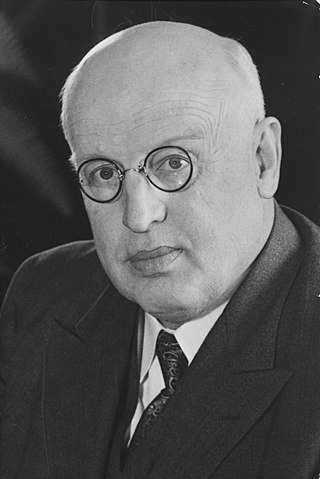
William Aberhart, also known as "Bible Bill" for his radio sermons about the Bible, was a Canadian politician and the seventh premier of Alberta from 1935 to his death in 1943. He was the founder and first leader of the Alberta Social Credit Party, which believed the Great Depression was caused by ordinary people not having enough to spend. Therefore, Aberhart argued that the government should give each Albertan $25 per month to spend to stimulate the economy, by providing needed purchasing power to allow needy customers to buy from waiting businesses.
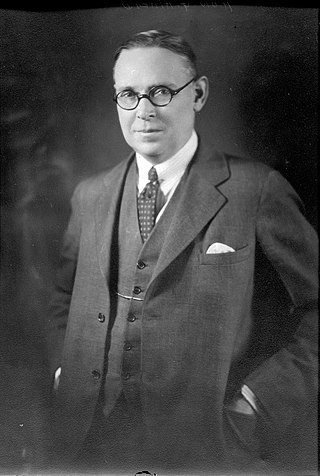
Richard Gavin "Dick" Reid was a Canadian politician who served as the sixth premier of Alberta from 1934 to 1935. He was the last member of the United Farmers of Alberta (UFA) to hold the office, and that party's defeat at the hands of the upstart Social Credit League in the 1935 election made him the shortest serving premier to that point in Alberta's history.

Alberta Social Credit was a provincial political party in Alberta, Canada, that was founded on social credit monetary policy put forward by Clifford Hugh Douglas and on conservative Christian social values. The Canadian social credit movement was largely an out-growth of Alberta Social Credit. The Social Credit Party of Canada was strongest in Alberta, before developing a base in Quebec when Réal Caouette agreed to merge his Ralliement créditiste movement into the federal party. The British Columbia Social Credit Party formed the government for many years in neighbouring British Columbia, although this was effectively a coalition of centre-right forces in the province that had no interest in social credit monetary policies.
John Campbell Bowen was a clergyman, insurance broker and long serving politician. He served as an alderman in the City of Edmonton and went on to serve as a member of the Legislative Assembly of Alberta from 1921 to 1926, sitting with the Liberal caucus in opposition. He also briefly led the provincial Liberal party in 1926.
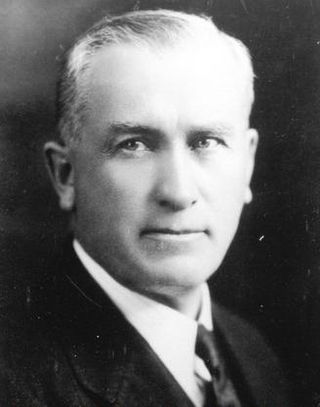
David Milwyn Duggan was a Welsh-born Canadian politician who was the Mayor of Edmonton from 1920 to 1923, a member of the Legislative Assembly of Alberta, and a leader of the Conservative Party of Alberta.

Joseph Henry Unwin was a politician from Alberta, Canada. He served in the Legislative Assembly of Alberta from 1935 to 1940 as a member of the Social Credit Party.

Christopher Pattinson was a Canadian provincial politician from Alberta. He served as a member of the Legislative Assembly of Alberta from 1926 to 1935 sitting with the Dominion Labor Party caucus in opposition.
The Alberta Social Credit leadership convention, 1968, took place in the Northern Alberta Jubilee Auditorium in Edmonton, Alberta, Canada, on December 4, 1968, to select a candidate to replace Ernest Manning as leader of the Social Credit Party of Alberta. Because Social Credit enjoyed a substantial majority in the Legislative Assembly of Alberta at the time and because convention dictates that the Lieutenant-Governor of Alberta asks the leader of the largest party in the legislature to form government, the contest was a de facto selection of the next Premier of Alberta. Harry Strom, long-time Minister of Agriculture and later Minister of Municipal Affairs in Manning's government, came out on top of a six-person field on the second ballot.
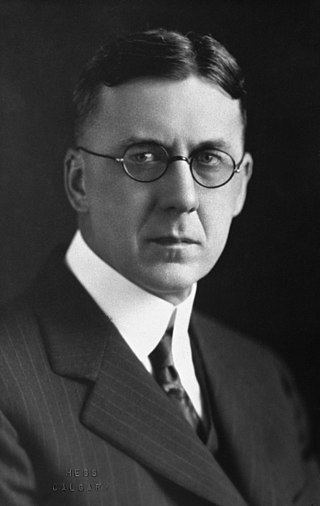
The John Brownlee sex scandal occurred in 1934 in Alberta, Canada, and forced the resignation of the provincial Premier, John Edward Brownlee. Brownlee was accused of seducing Vivian MacMillan, a family friend and a secretary for Brownlee's attorney-general in 1930, when she was 18 years old, and continuing the affair for three years. MacMillan claimed that the married premier had told her that she must have sex with him for his own sake and that of his invalid wife. She had, she testified, relented after physical and emotional pressure. Brownlee called her story a fabrication, and suggested that it was the result of a conspiracy by MacMillan, her would-be fiancé, and several of Brownlee's political opponents in the Alberta Liberal Party.
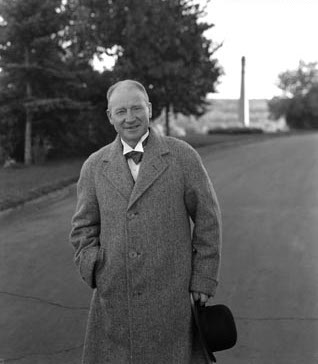
John William Hugill was a Canadian lawyer and politician who served as Attorney General of Alberta from 1935 until 1937. Born in England, he came to Canada and studied law before setting up a practice in Calgary. He became a prominent resident of that city, and served two years on its city council. In the early 1930s, he was one of the few prominent Calgarians with mainstream respectability to support William Aberhart's Social Credit League. He was elected as a candidate for it in the 1935 provincial election and, when it formed government, was named Attorney General by Aberhart.

John Farquhar Lymburn was a Canadian politician who served as Attorney-General of Alberta from 1926 until 1935. Born and educated in Scotland, he came to Canada in 1911 and practiced law in Edmonton. In 1925, John Edward Brownlee became Premier of Alberta, and sought a lawyer without partisan affiliation to succeed him as attorney-general. Lymburn accepted the position, and was elected to the Legislative Assembly of Alberta in the 1926 election. As attorney-general, Lymburn took part in negotiations between the Alberta and federal governments over natural resource rights, prepared Alberta's submission in the Persons case, and played a minor role in the sex scandal that forced Brownlee from office. In the 1935 provincial election, Lymburn and all other United Farmers of Alberta candidates were defeated, as William Aberhart led the Social Credit League to victory. Lymburn made an unsuccessful attempt to return to the legislature in 1942, and briefly returned to prominence during the Bankers' Toadies incident, before dying in 1969.

Edith Blanche Rogers was a Canadian politician who served as a member of the Legislative Assembly of Alberta from 1935 until 1940. Born in Nova Scotia, she came west to Alberta to accept a job as a teacher. She later moved to Calgary where she encountered evangelist William Aberhart and became a convert to his social credit economic theories. After advocating these theories across the province, she was elected in the 1935 provincial election as a candidate of Aberhart's newly formed Social Credit League.

The 1937 Social Credit backbenchers' revolt took place from March to June 1937 in the Canadian province of Alberta. It was a rebellion against Premier William Aberhart by a group of backbench members of the Legislative Assembly (MLAs) from his Social Credit League. The dissidents were unhappy with Aberhart's failure to provide Albertans with CA$25 monthly dividends through social credit as he had promised before his 1935 election. When the government's 1937 budget made no move to implement the dividends, many MLAs revolted openly and threatened to defeat the government in a confidence vote.
The Accurate News and Information Act was a statute passed by the Legislative Assembly of Alberta, Canada, in 1937, at the instigation of William Aberhart's Social Credit government. It would have required newspapers to print "clarifications" of stories that a committee of Social Credit legislators deemed inaccurate, and to reveal their sources on demand.
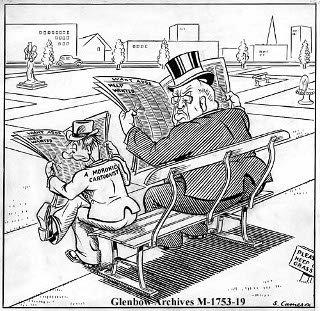
Stewart Cameron (1912–1970) was a Canadian cartoonist best known for his cowboy cartoons and his editorial cartoons lampooning Alberta Premier William Aberhart. Born in Calgary, Alberta, the son of prominent lawyer J. McKinley Cameron, he studied art at Mount Royal College, running a pack-string in the Rocky Mountains during the summers, before taking a job with Walt Disney Studios working on Snow White and the Seven Dwarfs in January 1936. At the same time, he drew some editorial cartoons for the Calgary Herald. The Herald was opposed to Social Credit League leader William Aberhart, and Cameron's cartoons reflected this. After Aberhart won the 1935 election, the Herald hired Cameron as its first full-time editorial cartoonist in 1936. His cartoons alienated the Social Credit faithful; his house was once bombed while he was away from it.
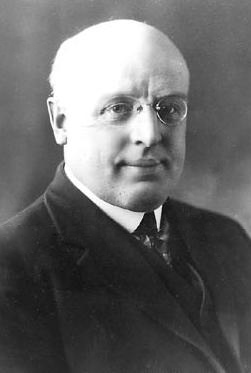
The Social Credit Board was a committee in Alberta, Canada from 1937 until 1948. Composed of Social Credit backbenchers in the Legislative Assembly of Alberta, it was created in the aftermath of the 1937 Social Credit backbenchers' revolt. Its mandate was to oversee the implementation of social credit in Alberta. To this end, it secured the services of L. Dennis Byrne and George Powell, two lieutenants of social credit's British founder, C. H. Douglas.

John Lyle Robinson was a Canadian politician who served as a member of the Legislative Assembly of Alberta from 1935 until his death in 1953 sitting with the Social Credit caucus. He served in the government of Ernest Manning as Minister of Industries and Labour from 1948 until 1953.
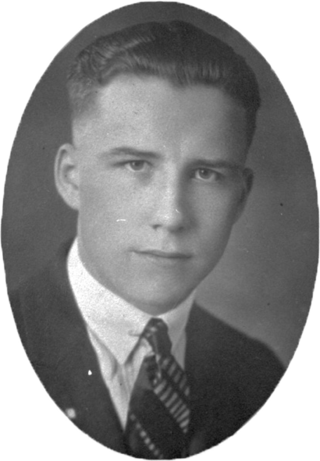
Joseph Lucien Paul Maynard was a lawyer and a provincial politician from Alberta, Canada. He served in the Legislative Assembly of Alberta from 1935 to 1955 as a member of the Social Credit Party.
The following is a bibliography of Alberta history.
